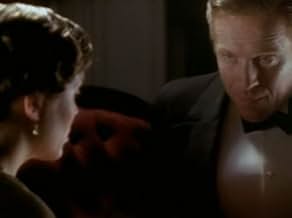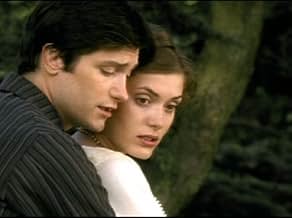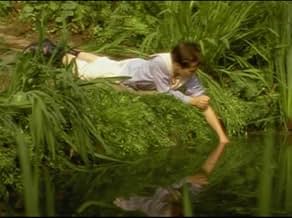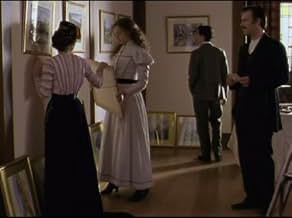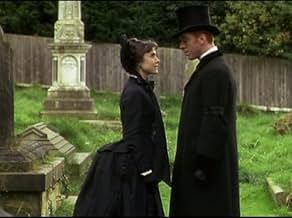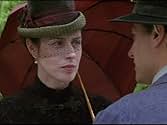Crónica de las vidas de tres generaciones de la familia británica de clase media alta, los Forsyte, desde la década de 1870 hasta 1920.Crónica de las vidas de tres generaciones de la familia británica de clase media alta, los Forsyte, desde la década de 1870 hasta 1920.Crónica de las vidas de tres generaciones de la familia británica de clase media alta, los Forsyte, desde la década de 1870 hasta 1920.
- Ganó 1 premio BAFTA
- 2 premios y 4 nominaciones en total
Explorar episodios
Argumento
¿Sabías que...?
- CuriosidadesWendy Craig was asked to play Aunt Juley as she had done in the first series but was not available because of her regular role in The Royal (2003).
- Citas
Soames Forsyte: You know nothing about it. Your friendship with her was a sham!
June: Yes! She stole the love of my life, my future. I should hate her but the alternative was you. I cannot hate her. I can only wonder why she did not do it sooner.
- ConexionesFeatured in The Best of Masterpiece Theatre (2007)
- Banda sonoraIrene's Song
(End titles music)
Music by Geoffrey Burgon
Lyrics by Jacqueline Kroft
Performed by Bryn Terfel
Reseña destacada
Comparisons between the 60s version of this splendid work and the latest one are difficult because they were both great. I have really enjoyed the last version especially as regards the performances of Damian Lewis and Gina McKee.
One previous contributor said that he found himself almost liking Soames which 'we were not supposed to do'. Is that right? Galsworthy intended The Forsytes to be representative of the upper middle class with some bad aspects - arrogance, lack of sentiment, conscious always of their respectability - but also with a positive side - sturdy, determined, ambitious, but ultimately concerned with ownership and property. Soames is an extreme example of his kind, to the extent that he regards people - especially his wife - as potential property. Irene, on the other hand, represents the new force which, along with the effects of WWI and the rise of the Welfare State, nationalisation etc will soon overthrow the old order.
Superficially at least, Soames is the villain. He appears to terrorise his wife, physically abuses her and more. However, is there another side to this? Irene marries him quite cynically for materialistic reasons. It's not merely a question of 'not loving' him. He positively makes her flesh creep right from the start. We are given the idea that she is forced to marry him by her stepmother and by her poverty. Force her?? As the story goes forward, we see that she is a strong character - no-one can force her to do anything. Her poverty? She has £50 per annum from her father. This might not seem a lot, but it was about what an artisan earned in a year at that time (on which he was expected to keep a family). Despite his treating her as property, Soames does love Irene in his way and he does try his best to give her what she wants. In return she is openly unfaithful to him, denies him children and even conjugal rights. As regards his bad treatment of her, she certainly returns the compliment in kind. She could be looked on as something of a vampire - she sucks the life force from Soames and old Jolyan and wantonly destroys the happiness of her friend June and Bossiney (though admittedly he goes along willingly). As regards her own son her hatred of Soames tempers her dislike of Fleur so even her son is badly affected by her force of character and neurosis.
I think Galsworthy, as well as writing a simple commentary on Edwardian and Victorian life was also trying to divide his readers into factions - the pro-Soames camp who like the old ways, and the pro-Irene (the 'new woman' camp) who wanted change.
Whatever, I have to congratulate Gina McKee. She carried off that complex character of Irene so well. Her enigmatic Mona Lisa smile, did it display goodness? Or the opposite? I'm still not sure
One previous contributor said that he found himself almost liking Soames which 'we were not supposed to do'. Is that right? Galsworthy intended The Forsytes to be representative of the upper middle class with some bad aspects - arrogance, lack of sentiment, conscious always of their respectability - but also with a positive side - sturdy, determined, ambitious, but ultimately concerned with ownership and property. Soames is an extreme example of his kind, to the extent that he regards people - especially his wife - as potential property. Irene, on the other hand, represents the new force which, along with the effects of WWI and the rise of the Welfare State, nationalisation etc will soon overthrow the old order.
Superficially at least, Soames is the villain. He appears to terrorise his wife, physically abuses her and more. However, is there another side to this? Irene marries him quite cynically for materialistic reasons. It's not merely a question of 'not loving' him. He positively makes her flesh creep right from the start. We are given the idea that she is forced to marry him by her stepmother and by her poverty. Force her?? As the story goes forward, we see that she is a strong character - no-one can force her to do anything. Her poverty? She has £50 per annum from her father. This might not seem a lot, but it was about what an artisan earned in a year at that time (on which he was expected to keep a family). Despite his treating her as property, Soames does love Irene in his way and he does try his best to give her what she wants. In return she is openly unfaithful to him, denies him children and even conjugal rights. As regards his bad treatment of her, she certainly returns the compliment in kind. She could be looked on as something of a vampire - she sucks the life force from Soames and old Jolyan and wantonly destroys the happiness of her friend June and Bossiney (though admittedly he goes along willingly). As regards her own son her hatred of Soames tempers her dislike of Fleur so even her son is badly affected by her force of character and neurosis.
I think Galsworthy, as well as writing a simple commentary on Edwardian and Victorian life was also trying to divide his readers into factions - the pro-Soames camp who like the old ways, and the pro-Irene (the 'new woman' camp) who wanted change.
Whatever, I have to congratulate Gina McKee. She carried off that complex character of Irene so well. Her enigmatic Mona Lisa smile, did it display goodness? Or the opposite? I'm still not sure
- stuart-halliday
- 15 sept 2010
- Enlace permanente
Selecciones populares
Inicia sesión para calificar y añadir a tu lista para recibir recomendaciones personalizadas
- How many seasons does The Forsyte Saga have?Con tecnología de Alexa
Detalles
Contribuir a esta página
Sugerir un cambio o añadir el contenido que falta

Principal laguna de datos
What is the Brazilian Portuguese language plot outline for La saga de los Forsyte (2002)?
Responde







